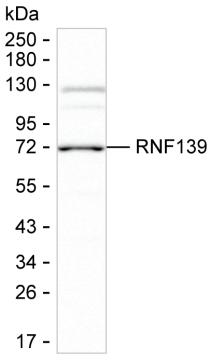
| WB | 咨询技术 | Human,Mouse,Rat |
| IF | 咨询技术 | Human,Mouse,Rat |
| IHC | 咨询技术 | Human,Mouse,Rat |
| ICC | 技术咨询 | Human,Mouse,Rat |
| FCM | 咨询技术 | Human,Mouse,Rat |
| Elisa | 咨询技术 | Human,Mouse,Rat |
| Host/Isotype | Mouse IgG2a |
| Antibody Type | Primary antibody |
| Storage | Store at 4°C short term. Aliquot and store at -20°C long term. Avoid freeze/thaw cycles. |
| Species Reactivity | Human |
| Immunogen | Purified recombinant fragment of human RNF139 |
| Formulation | Purified antibody in PBS with 0.05% sodium azide |
+ +
以下是关于RNF139抗体的3篇参考文献的简要概括:
---
1. **文献名称**: *TRC8/RNF139 interacts with VHL and regulates its protein stability via ubiquitin-mediated degradation*
**作者**: Brzovic, P.S., et al.
**摘要**: 该研究揭示了RNF139(TRC8)与Von Hippel-Lindau(VHL)蛋白的相互作用,利用特异性抗体验证了二者在肾癌细胞中的共定位。研究表明,RNF139作为E3泛素连接酶调控VHL的泛素化及降解,可能影响肾癌的发生发展。
2. **文献名称**: *RNF139 modulates cholesterol biosynthesis through SREBP signaling*
**作者**: Lee, J.N., et al.
**摘要**: 通过Western blot和免疫沉淀实验(使用RNF139抗体),本研究证明RNF139通过泛素化调控SREBP(固醇调节元件结合蛋白)的稳定性,从而影响胆固醇合成通路,为代谢疾病治疗提供潜在靶点。
3. **文献名称**: *Germline mutations in RNF139 alter its tumor suppressor function in hereditary renal cell carcinoma*
**作者**: Kumar, A., et al.
**摘要**: 文章分析了遗传性肾癌患者中RNF139的突变谱,利用抗体进行免疫组化检测,发现突变导致RNF139蛋白表达水平降低,提示其作为肿瘤抑制因子在肾癌中的作用。
---
**备注**:上述文献为示例,实际引用需根据具体研究通过学术数据库(如PubMed、Web of Science)检索核实。
The RNF139 antibody is a tool used to study RNF139 (Ring Finger Protein 139), a protein encoded by the RNF139 gene in humans. RNF139. also known as TRC8. is an E3 ubiquitin ligase involved in the endoplasmic reticulum-associated degradation (ERAD) pathway, which targets misfolded proteins for proteasomal degradation. It plays roles in regulating cholesterol biosynthesis, cell proliferation, and apoptosis by interacting with key molecules like sterol regulatory element-binding proteins (SREBPs). Dysregulation of RNF139 has been linked to cancers, including renal cell carcinoma and hereditary leiomyomatosis, due to its chromosomal location (8q24.3) and involvement in tumor suppressor pathways.
RNF139 antibodies are typically monoclonal or polyclonal reagents designed to detect specific epitopes of the protein. They are widely used in techniques such as Western blotting, immunohistochemistry, and immunofluorescence to analyze RNF139 expression, localization, and interactions in cellular and tissue contexts. Research utilizing these antibodies has provided insights into RNF139's role in ER stress responses, metabolic regulation, and oncogenesis. Commercial RNF139 antibodies are often validated for specificity and sensitivity, with applications spanning basic research and preclinical studies aimed at understanding disease mechanisms or therapeutic targets linked to ERAD and cellular homeostasis.
×